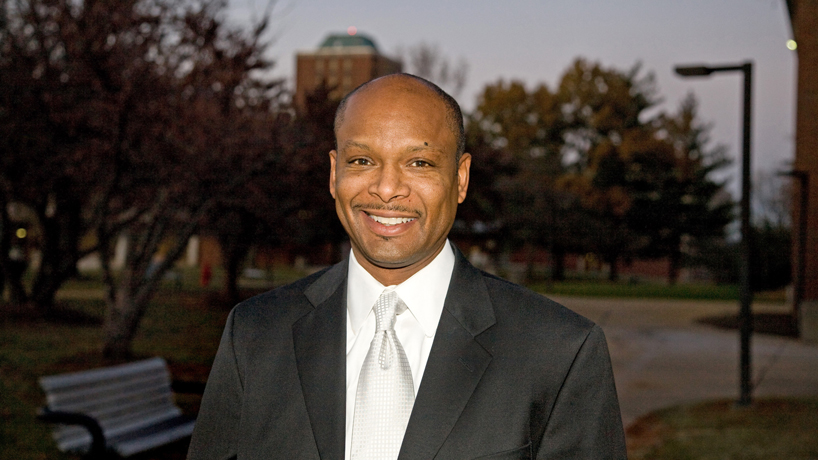
Dan Isom, the Endowed Professor of Policing and the Community at UMSL and a former St. Louis police chief, will deliver the keynote address at Hazelwood’s 15th annual Tribute to Dr. Martin Luther King Jr. at 7 p.m. Jan. 15. (Photo by August Jennewein)
Dan Isom is preparing to deliver the keynote speech Jan. 15 at Hazelwood’s 15th annual Tribute to Dr. Martin Luther King Jr., one of many events scheduled throughout the state this month to remember and celebrate the life and legacy of the great civil rights activist.
Isom, the Endowed Professor of Policing and the Community at the University of Missouri–St. Louis and a former St. Louis police chief, will be joined by Mizzou football radio color analyst Howard Richards and Hazelwood Mayor Matthew Robinson in the program for the free event, which will begin at 7 p.m. at Civic Center East in Hazelwood, Missouri.
It is not the first time Isom has been asked to speak at an event commemorating King.
He was still serving as the city’s police chief when he appeared in 2011 at the Old Courthouse during the annual celebration in downtown St. Louis and gave an impassioned talk about the need to “inspire the nation to have a moral obligation to educate our children” and prepare them for the challenge of chasing the American Dream.
The story in the next day’s St. Louis Post-Dispatch began, “There were preachers present at the annual Martin Luther King Jr. Day celebration on Monday, but it was Police Chief Dan Isom who brought the sermon.”
“It was interesting when I gave that speech. I was feeling a lot of emotions at the time,” Isom said earlier this week. “I think as police chief, you feel the weight of crime and violence in the community, and certainly the police department has a role in trying to maintain some order and control of things and keep people safe, but I always had this feeling that we didn’t do enough on the prevention end. We didn’t do enough as a community to address the underlying issues in terms of crime.”
He sees that as a continuing problem that Americans must tackle to fully realize King’s vision of a just society for all citizens.
Isom plans to borrow the theme from Missouri’s Dr. Martin Luther King Jr. Celebration Commission Kick-off program Jan. 7 at Harris-Stowe State University: “Their Time, Our Issues, a Dialogue with Young Leaders!”
“Of course, on an occasion like this, you try to interweave some of the principles that Dr. Martin Luther King espoused when he was alive,” Isom said.
But he also wants to speak to younger members of his audience.
“One of the things I saw with the activist movement that’s come out in recent years is there does seem to be a sort of change of the guard, especially on the local level, in terms of social activism, politics,” Isom said. “You can start to see that there is a change, kind of bubbling up from local communities. I do think we’re moving into that next generation of political and social activism.”
Isom has been impressed by the young leaders he’s seen sprouting up in the St. Louis region in recent years.
“It’s really exciting that they’re kind of challenging the status quo,” he said. “I think we saw that quite a bit in the national campaign, where there was this young, progressive movement butting up against the established way of thinking. I see a lot of energy and fresh perspectives coming from them, but also, they’re going through a learning phase.”
He continues to believe strongly that leaders need to work to educate themselves, as King did, and to prepare themselves through planning and building a clear set of objectives.
“One of the things that you see with this social activism movement was young people are out there protesting and other things but they didn’t have a long-range plan,” he said. “What do we want to accomplish in the end in terms of policy changes, programs, legislative changes? Have a plan, an end game, a goal.”
Isom noted the speech that King gave in Memphis, Tennessee, the night before his assassination, when he declared “I’ve been to the mountaintop” and “I’m not worried about anything. I’m not fearing any man. Mine eyes have seen the glory of the coming of the Lord.”
It’s one still cited often nearly 50 years later.
“People don’t know that he gave that speech many times before,” Isom said. “It was a powerful message, but he had practiced that message over and over again and on that day delivered it in an extremely powerful way that people remember.”
One thing that made King stand apart – and something Isom aims to convey on Jan. 15 – is the need for character. To be truthful, reliable and respectful of others.
He wants those in attendance also to inherit King’s concern for community.
“President [Barack] Obama says this a lot – that you have to have some cause that’s greater than just yourself,” Isom said. “People will get behind a leader who is promoting an agenda that’s not just about themselves, that takes into consideration the fate of the community.
“That’s kind of my recipe for young leaders.”














